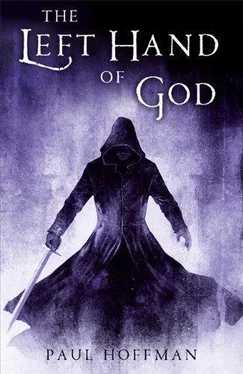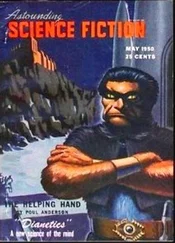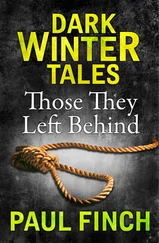They heaved, and then with a screech the door shifted. They stepped back, alarmed. To be heard was to be caught, to be caught was to be subject to God knows what.
“We could be hanged for this,” said Cale. The others looked at him.
“They wouldn’t. Not a hanging.”
“The Militant told me that the Lord of Discipline was looking for an excuse to set an example. It’s been five years since the last hanging.”
“They wouldn’t,” repeated Vague Henri, shocked.
“Yes, they would. This is a door, for God’s sake. You have a key.” Cale turned to Kleist. “You lied to me. You’ve got no idea what’s in there. It’s probably a dead end, nothing worth stealing, nothing worth knowing.” He looked back at the other boy. “It isn’t worth the risk, Henri, but it’s your neck. I’m out.”
As he started to turn, a voice called from the ambo, angry and impatient.
“Who’s there? What was that noise?”
Then they heard the sound of a man stepping onto the gravel in front of the Hanged Redeemer.
Sheer terror would be mild compared to what Kleist and Henri felt as they heard that sound, the knowledge of the cruelty coming to them for their stupidity-the vast and silent crowd waiting in the gray light, their screams as they were dragged to the gallows, the terrible hour-long wait as Mass was sung and then the rope and being hauled into the air, choking and kicking.
But Cale had already moved over to the door and with one silent surge of effort lifted the door up from its collapsing hinges and pushed. It swung open almost silently. He reached for the shoulders of the two motionless boys and pushed them into the gap. Once they were in, he squeezed himself in after them and with another huge effort shut the door behind him, again almost silently.
“Come out! At once!” The sound of the man’s voice was muffled, but still clear.
“Give me the key,” said Cale. Kleist handed it over. Cale turned to the door and felt for the lock. Then he paused. He did not know how to use a key. “Kleist! You!” he whispered. Kleist felt for the lock and then slipped in the heavy key.
“Quietly,” said Cale.
With a trembling hand that knew that what it was doing was death or life, Kleist twisted the key.
It turned with what seemed to them the clang of a hammer on an iron pot.
“Come here now!” demanded the muffled voice. But Cale could hear that there was uncertainty in it. Whoever was out there in the fog was unsure of what he had heard.
They waited. In the silence only the light rasp of the breathing of the fearful. Then they could just make out the muffled crunch of gravel as the man turned away, the sound quickly swallowed up.
“He’s gone for the Gougers.”
“Perhaps not,” said Cale. “I think it was the Lord Vittles. He’s an idle fat bastard and he wasn’t sure what he heard. He could have searched the bushes but he wouldn’t make the effort. He’ll be wary of getting the Gougers out with the dogs when he wasn’t even ready to check behind a few bushes because of the strain on his lardy carcass.”
“If he comes back tomorrow when it’s light, he’ll find the door,” said Vague Henri. “Even if we escape now, they’ll come after us.”
“They’ll come after someone and they’ll make sure they find them, whether they’re guilty or not. There’s nothing to connect us with this place. Someone will take it in the neck but there’s no reason it should be us.”
“What if he has gone for help?” said Kleist.
“Unlock the door and let’s get out.”
Kleist felt for the door and patted his way down to the key sticking out of the lock. He tried to turn it but it wouldn’t budge. Then he tried again. Nothing. Then he twisted as hard as he could. There was a loud snap!
“What was that?” demanded Vague Henri.
“The key,” said Kleist. “It’s broken off in the lock.”
“What?” said Cale.
“It’s broken. We can’t get out. Not this way.”
“God!” swore Cale. “You half-wit. If I could see you, I’d wring your neck.”
“There might be another way out.”
“And how are we going to find it in the pitch black?” said Cale bitterly.
“I have a light,” said Kleist. “I thought we’d need one.”
There was a pause, with only the ruffling of Kleist searching his cassock, dropping something, finding it again and then some more ruffling. Then there were sparks as he struck a flint onto some dry moss. Quickly it began to flame, and in its light they could see Kleist touching it to the wick of a carrying candle. In a moment he had inserted it into its glass cap and they could look around for the first time.
It’s true that there was not much to be seen in the light of the carrying candle, only a poor illumination is to be had from the yellow rendered fat of animal meat, but it was clear to the boys as soon as they looked around that this was not a room but a blocked-off corridor.
Cale took the light from Kleist and examined the door.
“This plaster isn’t that old-a few years at most.”
In the corner something scuttled and the three of them had the same thought: rats.
The eating of rats was forbidden to the boys on religious grounds, but this was at least one taboo with a good reason behind it-they were disease on four legs. Nevertheless, the meat of a rat was considered a great treat by the boys. Of course, not everyone could be a rat butcher. The skill was much prized and was passed from butcher to trainee in exchange only for expensive swag and mutual favors. The rat butchers were a secretive lot and charged half the rat for their services-a price so high that from time to time some catchers had decided to dispense with them and try butchering for themselves, often with results that encouraged the others to pay up and be grateful. Kleist was a trained butcher.
“We don’t have time,” said Cale, realizing what was on his mind. “And the light isn’t good enough to prepare one.”
“I can skin a rat in the pitch black,” replied Kleist. “Who knows how long we’ll be stuck?” He pulled up his cassock and removed a large pebble from a pocket hidden in the hem. He took careful aim and then lashed it into the semidark. In the corner there was a squeal and a horrible scuttling. Kleist took the candle from Cale and walked toward the sound. He reached into his pocket and with great care unfolded a small piece of cloth and used it to get hold of the creature. With a flick of his wrist he snapped its neck and then put it in the same pocket.
“I’ll finish later.”
“This is a corridor,” said Cale. “It must’ve led somewhere once, maybe it still does.” As the one with the candle, Kleist took the lead.
After less than a minute Cale began to revise his opinions. No doorways, bricked up or otherwise, appeared as Cale had hoped.
“This isn’t a corridor,” said Cale at last, still keeping his voice low. “It’s more like a tunnel.”
For more than half an hour they walked on and moved quickly, despite the dark, because the floor was almost completely smooth and clear of rubbish.
Eventually it was Cale who spoke.
“Why did you tell me there was food when you’d never even been here?”
“Obvious,” said Vague Henri. “You wouldn’t have come otherwise, would you?”
“And how stupid that would have been. You promised me food, Kleist, and I was idiot enough to trust you.”
“I thought you were famous, you know, for not trusting people,” said Kleist. “Besides, we have a rat. I didn’t lie. Anyway, there is food.”
“How do you know?” said Henri, his voice betraying his hunger.
“There are lots more rats. Rats need to eat. They have to get it from somewhere.”
Читать дальше











